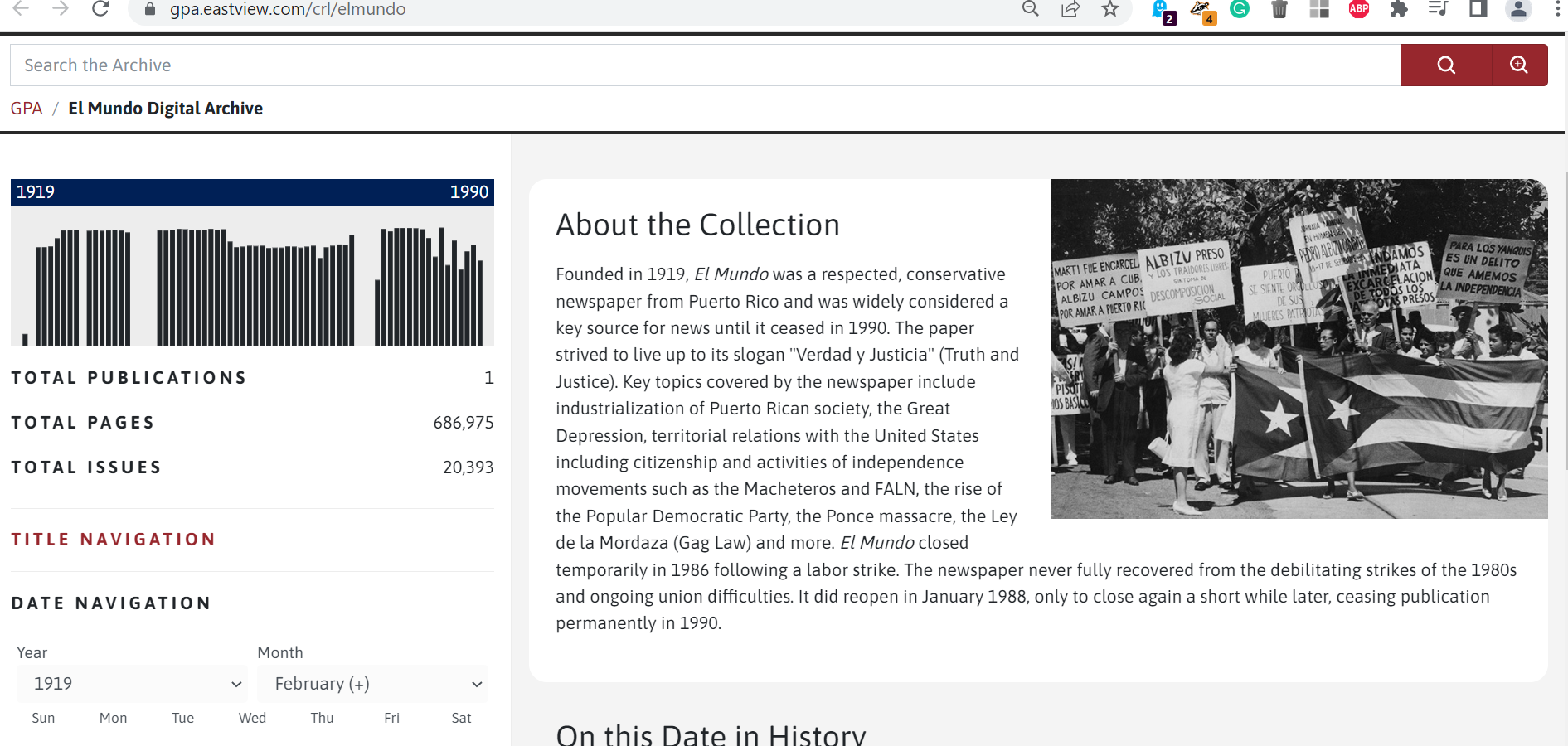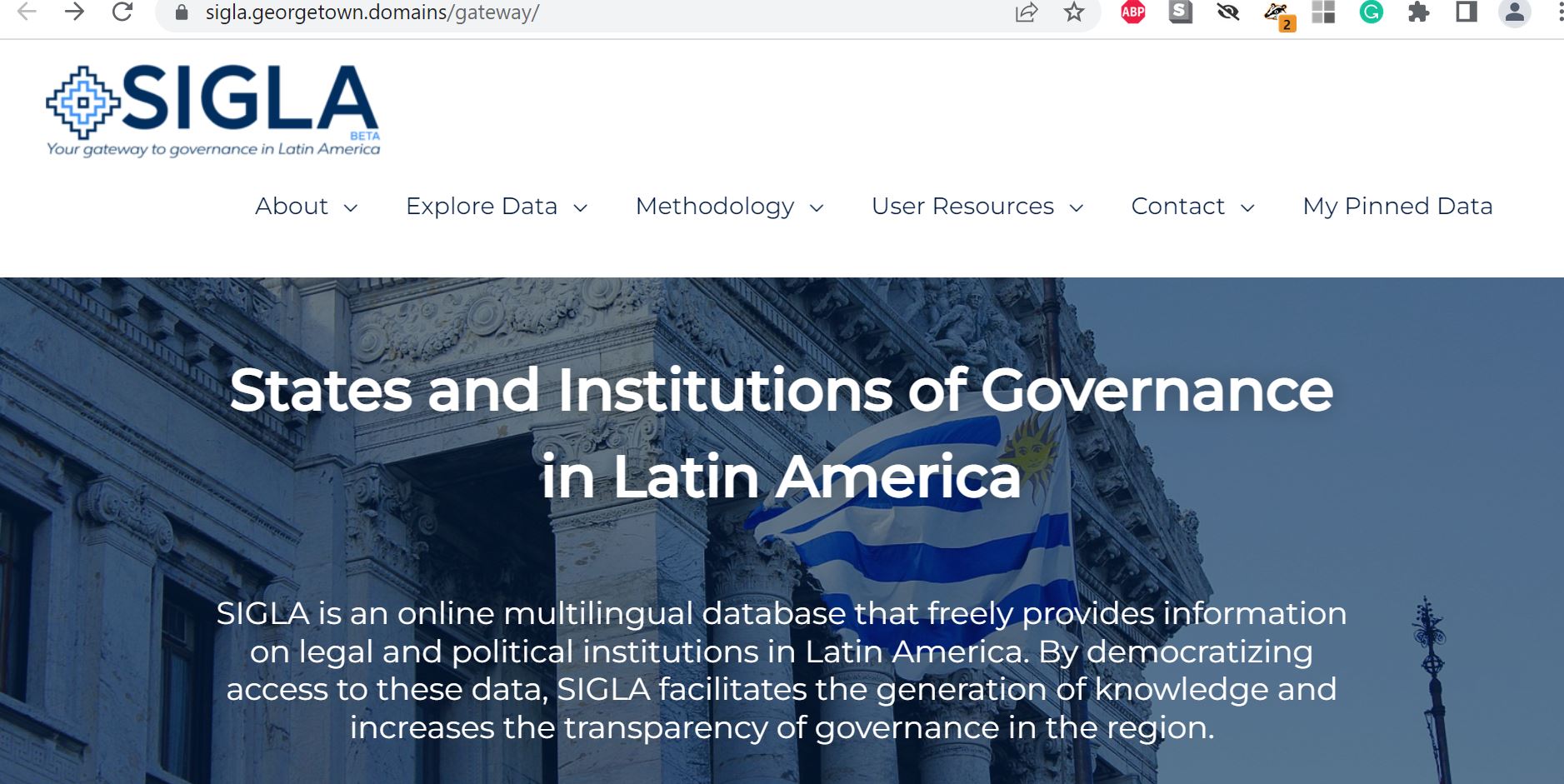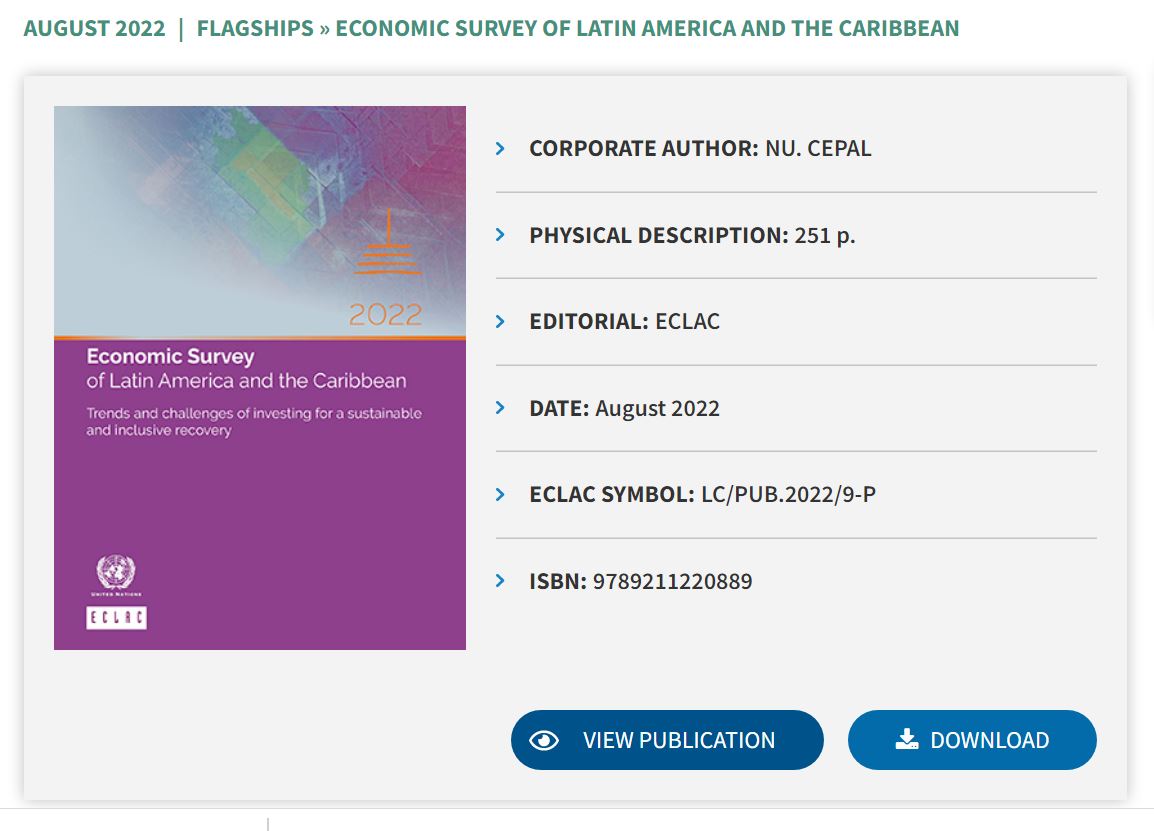Tag: Latin America
Curating Literature @UC Berkeley’s Center for Latin American and Caribbean Studies
Curating Literature

This online event on curating literary festivals will feature: Milena Britto, curadora literaria independiente; Natalia Brizuela, curadora y editora independiente; Cristina Fuentes La Roche, Directora, Hay Festival; Mauro Munhoz, Co-fundador y Director FLIP, Festa Literária Internacional de Paraty; Jamille Pinheiro Dias, curadora independente; Amalia Sanz, Directora FILBA, Festival Internacional de Literatura de Buenos Aires.
This event will be in Spanish and Portuguese, with simultaneous interpretation into English
Library purchases digital archive of Prensa Libre (Guatemalan Newspaper): 1951-2024
UC Berkeley Library has purchased ongoing access to Prensa Libre Digital Archive (1951-2024). Prensa Libre is a well-respected Spanish-language Guatemalan Newspaper. It began publishing in 1951, and since then has provided extensive coverage of politics, news, social conditions, history, governance issues, Garífuna, Mayan, and other indigenous communities (Pueblos Originarios en Guatemala), and civil war(s) in Guatemala and Central America.
We hope that this newspaper resource will be of great use to our faculty and students who study Anthropology, Politics Social Sciences, History of Central America, and Latin America.
Prensa Libre digital archive can be accessed from off-campus locations using the proxy or VPN here.
Below is the screenshot of the landing page of the archive. It has a robust search interface.
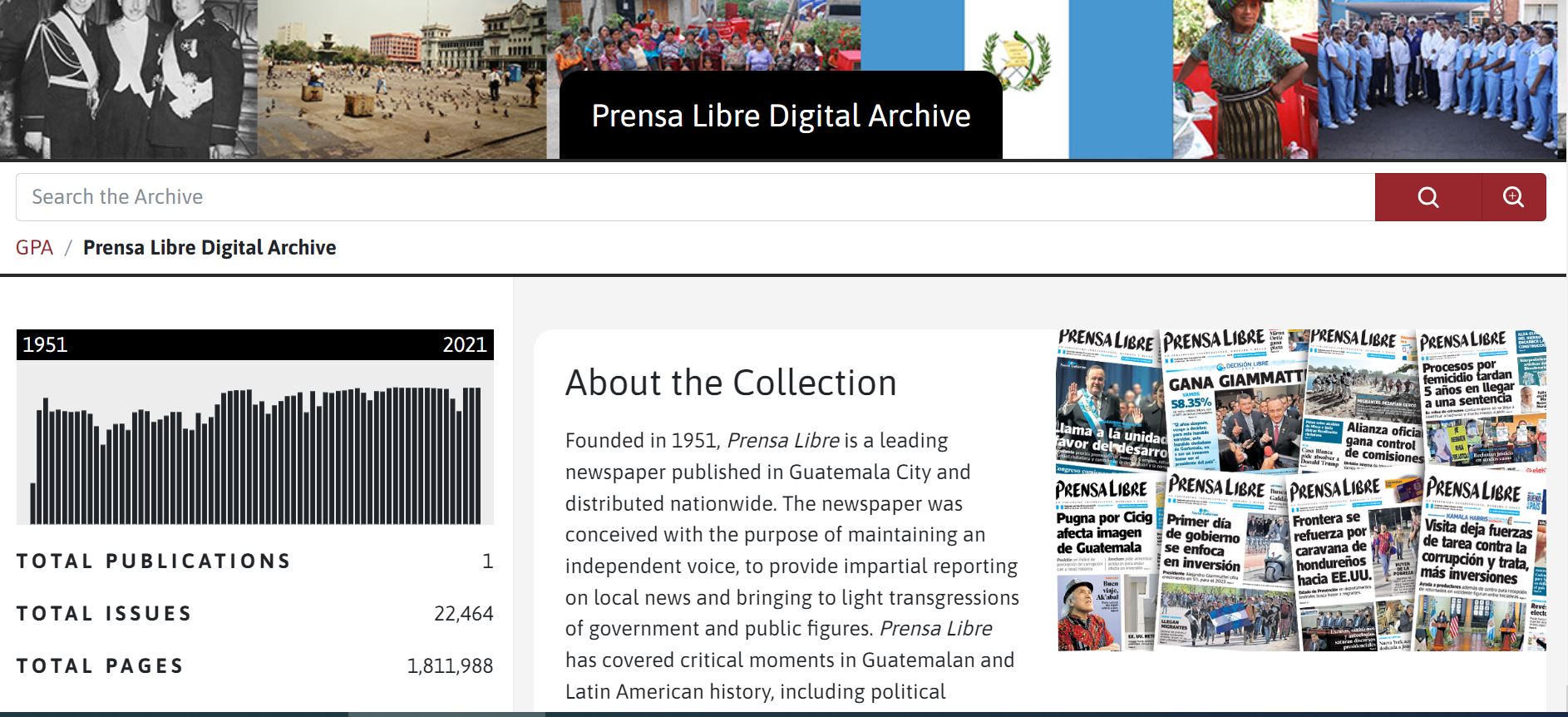
Primary Sources: Feminism in Cuba, 1898-1958
The Library recently acquired Feminism in Cuba, 1898-1958 a digital archive of documents relating to feminists and the feminist movement in Cuba between Cuban independence and the end of the Batista regime.
According to the collection description, “in the decades following its independence from Spain in 1898, Cuba adopted the most progressive legislation for women in the western hemisphere. This collection provides a documentary explanation of how a small group of women and men helped to shape broad legal reforms, by describing their campaigns, the version of feminism they adopted with all its contradictions, and contrasts it to the model of American feminism.”
The archive includes a wide range of primary sources, including letters, journal essays, radio broadcasts, and personal memoirs.
Prensa Libre (Guatemalan Newspaper) Archive Trial at UC Berkeley Library
The Library has started a thirty-day trial of Prensa Libre Newspaper. One can access the resource by authenticating from an off-campus location using the following hyperlink: https://libproxy.berkeley.edu/login?qurl=https%3A%2F%2Fgpa.eastview.com%2Fpren%2F
Currently, the full-text content is available for the issues starting in 1980 through 2022.
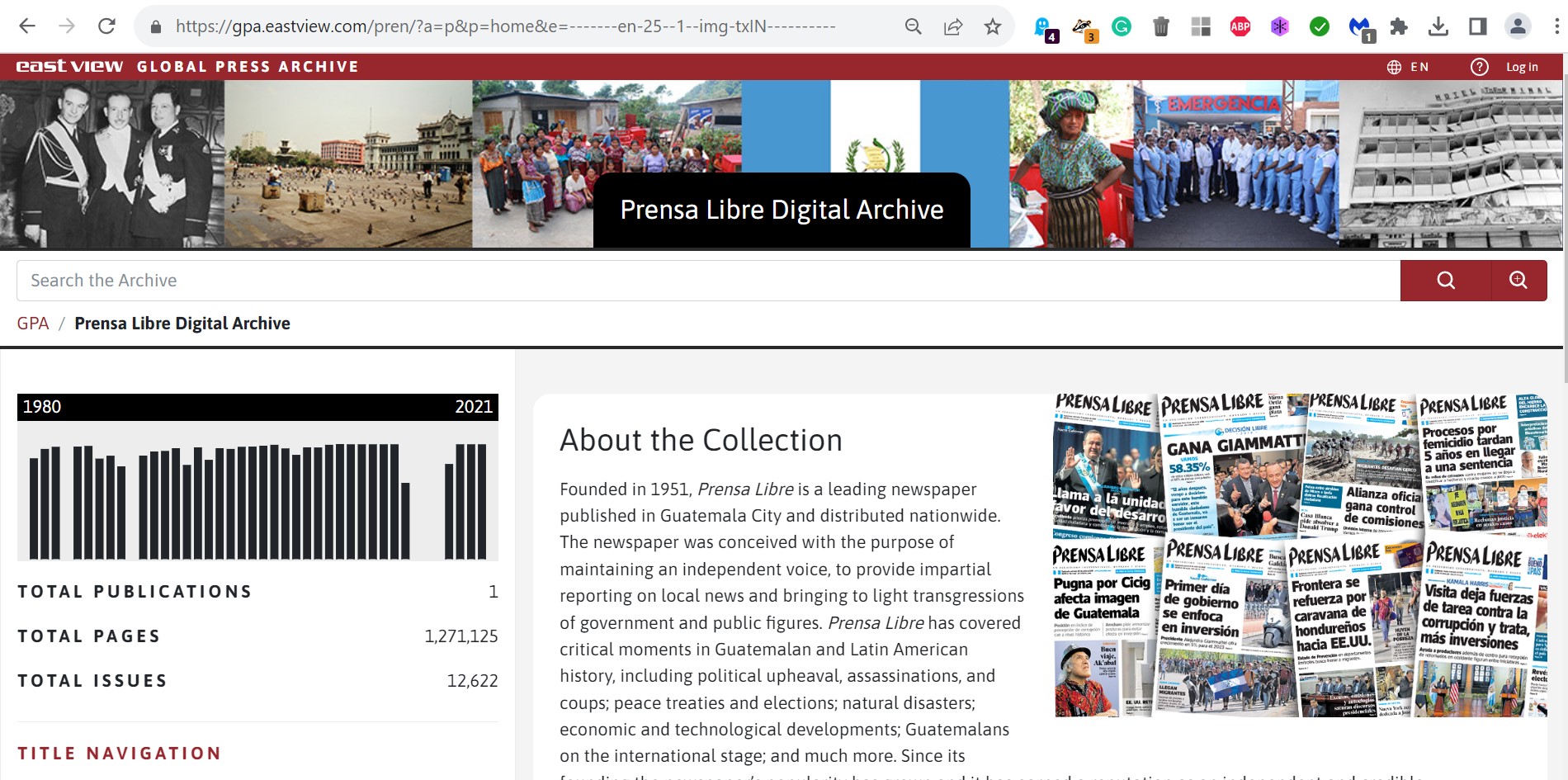
Prensa Libre fue fundado el 20 de agosto de 1951 por Pedro Julio García, Álvaro Contreras Vélez, Salvador Girón Collier, Mario Sandoval Figueroa e Isidoro Zarco Alfasa.
Prensa Libre is a Guatemalan newspaper published in Guatemala City by Prensa Libre, S.A. and distributed nationwide. It was formerly the most widely circulated newspaper in the country and as of 2007 it has the second-widest circulation.[1] It is considered a local newspaper of record. It was founded in 1951. (Source: Wikipedia)
El Mundo Digital Archive (Puerto Rico): 1919-1990 [Open Access]
I am glad to report that the Center for Research Libraries, in collaboration with Eastview’s Global Press Archive platform, has released the full text of El Mundo newspaper published in Puerto Rico from 1919-1990.
Established in 1919, El Mundo was a well-respected and conservative newspaper hailing from Puerto Rico, widely acknowledged as a prominent news source until its cessation in 1990. The publication diligently aspired to uphold its motto of “Verdad y Justicia” (Truth and Justice). El Mundo extensively covered a range of significant topics, including the industrialization of Puerto Rican society, the impact of the Great Depression, territorial relations with the United States encompassing citizenship, activities of independence movements such as the Macheteros and FALN, the emergence of the Popular Democratic Party, the Ponce massacre, the enactment of the Ley de la Mordaza (Gag Law), and more. In 1986 El Mundo temporarily closed due to a labor strike, which inflicted lasting damage on the newspaper. Despite reopening in January 1988, the publication faced ongoing union difficulties and ceased operations permanently in 1990.
SIGLA: States and Institutions of Governance in Latin America Database
SIGLA (States and Institutions of Governance in Latin America, www.sigladata.org) is a multilingual digital database that freely provides information on legal and political institutions in Latin America. The beta version of SIGLA offers data on national-level institutions in Brazil, Colombia, and Mexico, as well as on international institutions. Ultimately, SIGLA will provide cross-nationally comparable, current and historical, qualitative and quantitative data on over 50 legal and political institutions in 20 Latin American countries in English, Spanish, and Portuguese.
Bancroft Roundtable: California and the Making of ‘Latin America’: A View From the 19th-Century Hemispheric Archive
California and the Making of ‘Latin America’: A View From the 19th-Century Hemispheric Archive
February 16, 2023 | Noon | Register via Zoom
Presented by Alexander Chaparro-Silva, Ph.D. candidate in history, The University of Texas at Austin, and 2022 recipient of The Bancroft Library Summer Study Award
During the 19th century, many intellectuals and diplomats from Latin America came to California, published continental newspapers and books, sponsored intellectual circles and political clubs, and established transnational correspondence networks to engage with the political problems common to the American hemisphere. These transnational crossings contributed to debates over slavery, citizenship, and immigration in Latin America and reinforced an Anglo/Latin distinction within the hemisphere as the boundary between two competing civilizations. Drawing upon 19th-century printed materials, travelogues, diaries, official documents, and diplomatic correspondence — many from The Bancroft Library — Alexander Chaparro-Silva will explore the role of these hemispheric mobilities in the making of the geopolitical category of “Latin America,” and reflect on the possibilities and challenges of assembling a hemispheric archive dispersed across a vast geography.
We look forward to seeing you at these talks.
Cuba: Grito de Yara (10 October 1868)
Each year, on 10th October, the Cubans all over the world commemorate the call for national independence. The “Grito de Yara,” is one of many important events in the complex historical trajectory of Cuba that unleashed the potential of the national consciousness through rebellions against the Spanish imperial authorities. The full text of the “Manifiesto de la Junta Revolucionaria de la Isla de Cuba” can be read by clicking on the link here.
At UC Berkeley Library, despite our West Coast location and our Pacific Rim orientation, we have a large collection of books that will enlighten our readers about what does “Grito de Yara” means. The other essential Open Access source is dLOC (Digital Library of the Caribbean) where one can browse documents related to the “Grito de Yara.“
Below are some titles that might of interest to the readers of this blog. Since we believe in the equitable access, I am providing some links to the full-text of these items.
Below is a clip from a film,
Professor Rebecca Herman’s New Book Published: Cooperating with the Colossus A Social and Political History of US Military Bases in World War II Latin America Cooperating with the Colossus A Social and Political History of US Military Bases in World War II Latin America

Author:Rebecca Herman, the image is being used for academic, educational, noncommercial purposes only.
UC Berkeley’s Professor Rebecca Herman‘s (History) new book –Cooperating with the Colossus A Social and Political History of US Military Bases in World War II Latin America on our entanglement in Latin America since the World War II is one book that I feel honored to post about in this blog.
According to the Oxford University Press, the book has several interesting facets that are quoted from its website as follows,
- Offers a new perspective on the period of World War II and its importance in the longer history of US-Latin American relations
- Brings together the local, national, and international arenas in which the history of wartime basing unfolded
- Integrates the international history of US-Latin American relations together with local histories of labor, race, gender, and law
- Moves between the realm of high politics and the ground-level social and cultural histories of the communities surrounding US bases.
I am also pleased to post a video of her presentation at the CLAS-Berkeley.
We have access to its electronic avatar through our catalog. Thank you, Professor Rebecca Herman, for always motivating me to do my best to collect difficult to find materials from Latin America!
Economic Survey of Latin America and the Caribbean 2022: Trends and challenges of investing for a sustainable and inclusive recovery
The United Nation’s ECLAC has published a 2022 report on trends and challenges of investing for a sustainable recovery in Latin America and the Caribbean. Below is the self-description, “The 2022 edition of the Economic Survey of Latin America and the Caribbean consists of three parts. Part I outlines the region’s economic performance in 2021, analyses trends in the early months of 2022, and the outlook for growth for the year. It examines the external and domestic factors that have influenced the region’s economic performance in 2021, trends for 2022, and how these factors will affect economic growth in the coming years.
Part II of this edition presents some region’s main challenges in investing for sustainable and inclusive economic growth. It analyses the trends in total investment over the last 70 years and highlights the profound change brought about by the 1980s debt crisis, with a slowdown in investment from the 1990s onwards.
Part III of this publication may be accessed on the Economic Commission for Latin America and the Caribbean (www.eclac.org). It contains the notes relating to the economic performance of Latin America and the Caribbean countries in 2021 and the first half of 2022, together with their respective statistical annexes. The date for updating this publication’s statistical information was 15 July 2022.”
Please click on the image to access this Open Access publication.
